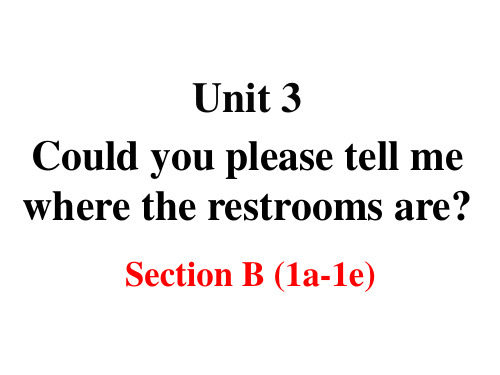九年级Unit3SectionB
- 格式:ppt
- 大小:1.09 MB
- 文档页数:27

人教版九年级全一册Unit 3 Section B 单词、短语、知识点默写及短文填空一、单词1.迷人的;极有吸引力的2.不昂贵的3.不拥挤的;人少的拥挤的n.人群v.挤满4.便利的;方便的5.商场;购物中心6.职员7.拐角;角落8.礼貌地;客气地9.要求;请求10.方向;方位11.正确的;恰当的12.有礼貌的;客气的13.直接的;直率的14.讲某种语言的;发言者15.谁;什么人16.不礼貌的;粗鲁的17.住址;地址;通讯处18.地下的;地铁19.停车场;停车区20.课程;学科21.意大利的;意大利人的;意大利人;意大利语意大利二、短语1.礼貌地寻求帮助2.听起来没那么有礼貌3.在不同的情况下4.依靠;信赖;取决于5.花费时间/金钱做某事6.引入;导入7.与某人交流8.去...的路9.介绍你自己10.因(做)某事感谢某人三、短文填空Could you please ...?When you visit a foreign country, it is important to know how to ask for help (polite). For example, “Where are the restrooms?” or “Could you please (tell) me where the restrooms are?” are similar(request) for directions to a place. Both (be) correct English, but the first one sounds less (polite). That is because it is a very direct question. It is not enough to just ask a question (correct). We also need to learn how to be polite by (be) less direct — or more (direct) — when we ask for help.(ask)for information or help is a very common and necessary activity, (especial) when we visit a foreign country. So (know) how to ask for information politely is important. In English, “Where are the restrooms?” and “Could you please tell me where the restrooms are” are similar requests both are correct English, but the (one) could sound rude. It’s important to use correct language, but sometimes this alone is not enough we need to learn how to be (polite) when we make requests.In English, as in Chinese, we change the way we speak when we talk with (difference) people. The (expression) you use might depend on whom you are (speak)to or how well you know them. If you (say) to your teacher, “When is the school trip?”, this might sound (polite). But if you say, “Excuse me, Mr. West. Do you know when the school trip is?”, this will sound much more polite. However, it is all right to ask direct questions in some (situation), like with your classmates.Usually polite questions (be) longer and include more language such as “Could you please ...?” or “Can I ask ...?” It sounds more polite to say, “Peter, could you please tell me your e-mail address?” than “Peter, tell me your e-mail address.” Sometimes we even need to spend time (lead) in to a request. For example, with a (strange) on the street, we might first say, “Excuse me, I wonder if you can help me” or “I’m sorry to trouble you, but ...” before (ask)for help.It might seem more difficult to speak politely than be direct. However, it is important (learn) how to use proper language. This will also help you (become) better at English, or any other language you wish to speak.。



九年级 Unit3第三课时Section B 1a — 2b教学目标1.记忆单词convenient,corner,politely,request,direction,correct,polite,direct,sp eaker,whom,impolite,address,underground。
2.通过听说训练,学习正确地描述地点和指路。
3.运用适当的阅读策略,理解如何礼貌和得体地使用语言。
教学重难点1.掌握描述场所特征的词汇,并能够给理想的场所提建议。
2.学会在不同的语言环境中能够礼貌得体地使用语言。
教具教师提前准备设计教学PPT,电子书等StepⅠ.Lead inLeading in 【情景1】T:Sometimes we may want to go to different places.Because they have different qualities.What kind of places do you like?S1:I like beautiful places.S2:I like interesting and fascinating places.S3:…T:What qualities are important for each place?S4:Safe.S5:…T:Different places have different qualities.[设计意图] 创设真实的语言交际环境,师生交流互动,以对话的方式导入新课,为接下来的训练奠定基础。
Leading in 【情景2】教师提供常见的地点或场所的图片,让学生猜测地点或场所对应的英文名称,引导学生想象可以用于描述这些地点或场所的形容词,然后展开关于地点或场所的对话,导入新课。
T:Look at the first picture.Is it a restaurant?S:No,it isn’t.I think it is …T:What do you think of it?S:I think it is …[设计意图] 利用直观的图片,调动学生的学习积极性,帮助学生复习关于地点或场所的词汇,进行简短的对话,导入新课。

